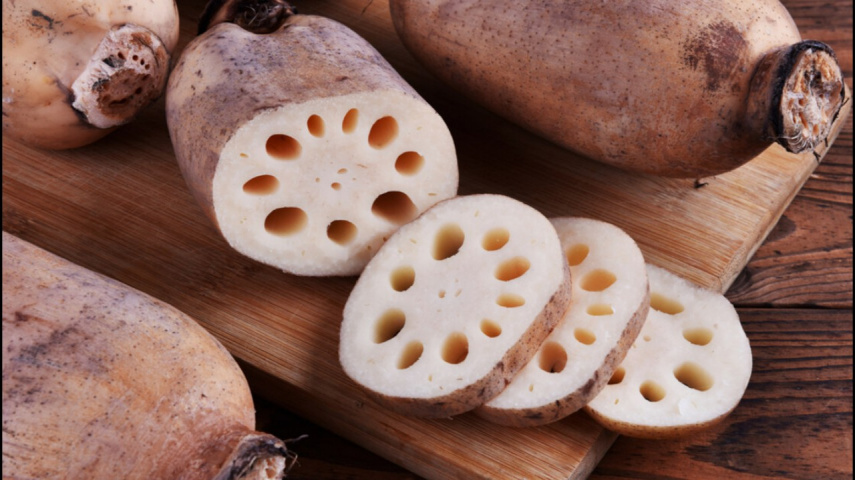10 Amazing Benefits of Lotus Root for Your Health
Lotus root has been widely used in medicine since ancient times due to its nutritional properties. Here are some benefits of lotus root that you must know about.

We may all be familiar with the beautiful and significant Lotus flower, but it's a lesser-known fact that there is something called the Lotus root too and it’s amazing for health. There are a variety of benefits of the lotus root for your overall health. This is a vegetable that also has medicinal uses and has been used in ancient medicine for its therapeutic properties. It is an excellent source of antioxidants, vitamins, and fiber which help with a variety of health issues like diabetes, liver health, gut health, and managing weight. Given its peculiar taste and health benefits it may easily fit into your diet and give a fun crispy twist to your meals. Lotus root contains a high variety of vitamins and minerals and is also a good source of carbs and fiber. The best part is that it contains no fat or cholesterol. Lotus root, when sliced, makes a snowflake-like display, making it ideal for an artistic garnish. Here are some of the advantages of experimenting with lotus root in the kitchen.
What Is Lotus Root?
The Lotus is an aquatic plant that grows mostly in South Asia. It is generally planted at the bottom of the river soils. The root can grow up to four feet long and is brown. The lotus root is used in cooking various dishes that are super tasty and nutritious. A fact that makes this plant fascinating is that the whole lotus plant is edible, right from its root to the seeds (1).
The lotus root is a common food in Asian cuisine and adds a different crunch and flavor to the food. It has a crunch texture and a flavor that may be similar to water chestnuts. Depending on the preparation the lotus root can have a slightly sweet and starchy flavor. The best part is that you can eat it raw or cooked. It can be easily added to salads, soups or be eaten as chips. The roots and extracts of this plant have also been used in ancient medicine for centuries now. It is said to have a host of benefits as it contains antioxidants and anti-inflammatory properties (2).
10 Health Benefits of Lotus Root

The Lotus root comes with a host of therapeutic benefits that makes it a common ingredient in Chinese and Ayurvedic medication. It has a rich nutrient profile and hence benefits your health. It has a good amount of carbohydrates, fiber, and antioxidants. If we look at the nutritional facts about the lotus root it is evident how this plant may be very healthy for your diet.
Half a cup of boiled lotus roots would contain 9.6 grams of carbohydrates, 1 gram of protein, 40 calories, and 0 fats. It also is a rich source of fiber, Vitamin B6, and Vitamin C. Following are the nutritional values of the lotus root according to the USDA for 100 grams of lotus root (3) :
- Calories: 86 kcal
- Fat: 2.6 g
- Sodium: 166 mg
- Carbohydrates: 15.5 g
- Fiber: 3.1 g
- Sugars: 0.5 g
- Protein: 1.58 g
- Vitamin C: 27.4mg
- Vitamin B: 0.2mg
Here are some health benefits that may make you consider incorporating this beautiful plant into your diet.
1. May Help Reduce Inflammation
One of the major benefits of lotus root is that it has anti-inflammatory properties. There can be various reasons for developing chronic inflammation, such as exposure to harmful substances, lack of exercise, poor diet, smoking, or long-term infections. If not treated, over a period of time inflammation can damage tissues and lead to heart disease and diabetes (4), (5).
Fermented lotus roots can help with reducing inflammation as they contain linoleic acid. This fatty acid can be instrumental in reducing inflammatory responses in the body and regulating the immune system. It also helps prevent acute hepatitis and autoimmune disease (6). Explaining more on this topic, our contributor Kelsey Costa, MS, RDN, and Owner of Nutrition Insights LLC, says, “Lotus root has been valued in traditional medicine for its anti-inflammatory properties, mainly due to its high content of phytochemicals like flavonoids and polyphenols. These compounds function as potent antioxidants, combating oxidative stress and inhibiting inflammatory pathways in the body. Therefore, consuming lotus root could potentially reduce symptoms of inflammation-related conditions and help prevent inflammation-related diseases.”
2. May Help Provide Protection Against Stomach Ulcers
The lotus stem contains antioxidant and anti-inflammatory properties, making it an ingredient that has gastroprotective effects. It contains many flavonoid and alkaloid compounds which act as antioxidants (7).
Research that was conducted on rats found that fermented lotus root could help protect the stomach against stomach ulcers. The antioxidant and anti-inflammatory properties speed up the recovery process of the mucus layer of the stomach (8).
3. May Help Boost Liver Health
Animal studies have found that lotus roots may protect the liver by reducing the accumulation of fat in the liver. The study observed that the consumption of lotus extract alone or along with a combination of taurine helped suppress the formation of fat droplets in the liver, thereby protecting the liver from diseases (9).
Another study done on mice found that orally consuming lotus root powder may help prevent non-alcoholic fatty liver disease. The study showed that lotus root may help suppress inflammatory gene expression associated with fatty liver disease and increase serum adiponectin levels thereby protecting the liver (10). Apart from this, it is also found that consuming fermented lotus root could help improve liver detoxification capacity and repair the cell damage due to alcoholism. Hence, it may be beneficial for acute alcoholism (11).
4. May Help Prevent Oxidative Stress
The lotus plant has antioxidants that help neutralize reactive molecules also known as free radicals. When free radicals build up in your body they can lead to oxidative stress. This damages your cells and may lead to a variety of diseases (12).
Some of the major antioxidants that are present in the lotus plant are quercetin, catechin, chlorogenic acid, and kaempferol. The part which seems to have the most concentration of antioxidative activity in the lotus plant are the seeds and leaves (13), (14), (15).
More research needs to be done on humans to understand the effects of lotus roots on health better. However, its antioxidant properties may be beneficial to protect yourself from a variety of diseases that stem from oxidative stress.
5. May Help Promote Gut Health
As we know from the nutritional values above, the lotus stem is an excellent source of fiber. Given it is rich in fiber, it may help with digestion. Sharing the importance of fiber, our contributor Mary Sabat, says, “Dietary fiber aids digestion by facilitating smoother and quicker transit through the digestive tract. Soluble fiber attracts water and turns to gel during digestion, slowing the process, while insoluble fiber remains unchanged, promoting material movement through the digestive system. This not only helps maintain regular bowel movements but also assists in preventing digestive problems like constipation, hemorrhoids, and diverticular disease.” It is a great source of natural proteins, fiber, and iron. It is well known that a high-fiber diet promotes regular bowel movements and increases fecal frequency and weight (16).
6. May Help Manage Diabetes
High blood sugar can lead to major complications for people with diabetes. There is some evidence that suggests that compounds present in the lotus stem could help in lowering blood sugar levels. A study done on rabbits found that consuming lotus leaf extract reduced blood sugar levels more significantly than regular diabetes medication (17). Another similar study also established that mice who consumed lotus seed extract experienced lower levels of blood sugar (18).
Another animal study done on rats also found that lotus root extracts could reduce blood sugar levels in normal rats as well as diabetic rats. (19).
Most of these studies of the benefits of lotus stem and blood sugar levels have been on animals and more studies need to be done on humans to make a stronger claim.
7. May Help with Allergies

Another benefit of lotus root is that it can help with allergies. Lotus root contains polyphenolic compounds and vitamin C, which help in reducing the production of serum histamine levels and also reduce other inflammatory parameters. Serum histamine is essentially a compound that is released by the body which triggers the allergic reaction. A study done on mice found that nasal allergy symptoms could be reduced by using lotus power (20).
8. May Boost Heart Health
The lotus root contains potassium which acts as a great vasodilator. This helps reduce the bad LDL cholesterol in the body. It also helps to prevent your arteries from clogging and in turn, reduces chances of heart attack. The lotus root also contains pyridoxine which helps in the management of homocysteine levels in the blood to then protect the heart.
9. May Help with Weight Loss
The lotus root extract has anti-obesity properties and can lower fat tissue weight (adipocytes). It reduces blood cholesterol levels by preventing lipid buildup in cells (21). This may also aid in the prevention of obesity-related diseases.
According to a study, lotus root extract may aid in the reduction of fat tissues in the body. Lotus root extracts or taurine supplementation may assist prevention of fat formation in tissues and may aid in weight loss. As a result, it may be good for weight management. However, further research is needed to confirm these potential human impacts (9).
However, if you are looking for help with weight loss, it may be essential to consult a doctor before making changes to your diet.
According to Dr. Allen Conrad, Doctor of Chiropractic and Owner of Montgomery County Chiropractic Center, “Adding high fiber foods to your diet like lotus root will help reduce gastrointestinal problems and can promote healthy weight loss when part of a balanced diet and exercise program.”
10. It Has Antibacterial Properties
There have been various studies on the lotus plant for its antibacterial properties. This includes studies about bacteria that also exist in your mouth. The exact mechanism by which lotus demonstrates antibacterial qualities is unknown, although the numerous beneficial chemicals it contains are likely to play a role.
According to research, lotus leaf extract helps combat the bacterial species that cause cavities and gum infections in your mouth. As a result, it may have the potential to be used as an ingredient in toothpaste and other oral care products (22), (23).
It should be noted, however, that these experiments were carried out in test tubes. Human studies are needed to have a better understanding of the potential of lotus to cure oral infections.
How to Add Lotus Root to Your Diet: Popular Recipes to Try
Lotus root has a unique flavor and tastes sweet and crunchy. Even after cooking the root, it doesn’t lose its crunchiness but softens and leaves a peculiar flavor. It is a versatile vegetable and may taste tender and creamy when baked. When stir-fried it may taste starchy and crunchy.
It is important to note here that it's better to cook the lotus root and then eat it. Boil or steam it to eat as eating the root raw can lead to bacterial infections. Peel off its skin and carefully rinse it before cooking for 10 minutes. If you want to soften the texture of the roots, boil them for no more than 20 minutes.
Here are a few recipes you can try:
1. Baked Root Chips

If you love potato chips, these may just be healthier alternatives. You can add spices on top to give it a spin as well.
Ingredients
- 2 tablespoons of olive oil
- 200 grams of lotus roots
- ½ tablespoon salt
- 1 teaspoon of freshly ground black pepper
Steps
- Prep your oven by preheating it to about 325 degrees Fahrenheit.
- Take a mixing bowl and mix all the ingredients.
- Place the sliced roots on a baking sheet and drizzle some oil.
- Bake the chips till they are golden brown, approximately for 20 mins.
- Drain them on a paper towel and they are ready to serve with a dip or other spices.
2. Stir Fry Lotus Root

This can become a quick savory side dish at your lunchtime.
Ingredients
- 300 grams of lotus root
- ¼ cup of chicken stock
- 1 cup of chopped mushrooms
- 2 teaspoons of oyster sauce
- ½ cup of chopped bell peppers
- 6 slices of ginger
- ¼ teaspoon sugar
- ? teaspoon of white pepper
- 2 tablespoons of oil
- 2 chopped scallions
- 2 minced garlic cloves
- 2 teaspoons of cornstarch
- 1 tablespoon dry sherry
- Salt as per taste
Steps
- For the first step, you need to blanch the lotus roots, mushrooms, and bell peppers for about 45 minutes. Once it’s done, set this aside.
- Now, make a mixture using the oyster sauce, salt, sugar, chicken stock, and white pepper in a mixing bowl.
- Over medium heat, saute garlic, ginger, and scallions for about a minute.
- Add your blanched vegetables to this and saute them for a few minutes.
- Now add the dry sherry from the edge of the wok and then the sauce mixture.
- It's now time to add the cornstarch-water mix to the wok and let it simmer for 30 seconds.
- Stir fry this for about 5 - 10 minutes until the vegetables are coated with the mixture.
- Your dish is ready to serve.
3. Lotus Root Soup

A lotus root and pork soup can be another way to enjoy the flavors of this ingredient.
Ingredients
- 500 grams of pork ribs
- 500 grams of lotus root
- 1 peeled and chopped carrot
- 1 dried and rinsed cuttlefish (optional)
- 100 grams peanuts
- 8 dried and deseeded dates
- Salt to taste
Steps
- Take 2 cups of boiling water and soak the peanuts in it for 30 minutes.
- Next, blanch the pork ribs for 5 minutes and set them aside.
- Chop the lotus roots into bite-sized pieces.
- Take a soup pot and add all the ingredients to it. Add some water and cover it.
- Get the soup to boil.
- Let the soup cook for 3-4 hours on low heat until the meat is tender.
- Add salt.
Conclusion
The lotus root has been widely used in Asian cultures for eons now. It has medicinal properties and hence has been used in Ayurvedic medicine as well. There are a host of benefits of lotus roots that we may be unaware of but this ingredient can be very therapeutic. It is known to have anti-inflammatory and antioxidant properties which help combat a variety of diseases.
It has a rich nutrient profile which makes it beneficial for digestion, weight management, blood sugar level management, and even protects the heart and the liver. It has a peculiar starchy, sweet, and crunchy taste and hence can be easily incorporated into your diet. It can be added to a stir fry or even eaten as chips. They make a great snack while keeping you healthy. It may be important to remember that an excess of anything can be problematic. When consumed in excess the lotus root can lead to problems. When trying to lose weight or manage conditions like diabetes, consult a doctor before making major changes to your diet.
Contributor: Kelsey Costa, MS, RDN, and Owner of Nutrition Insights LLC
ALSO READ: Health Benefits of Black Currant: Nutrition & How to Use





 JOIN OUR WHATSAPP CHANNEL
JOIN OUR WHATSAPP CHANNEL


































































































